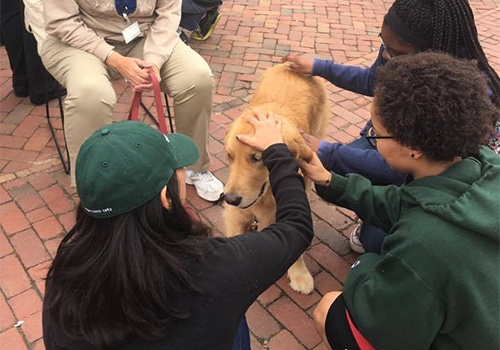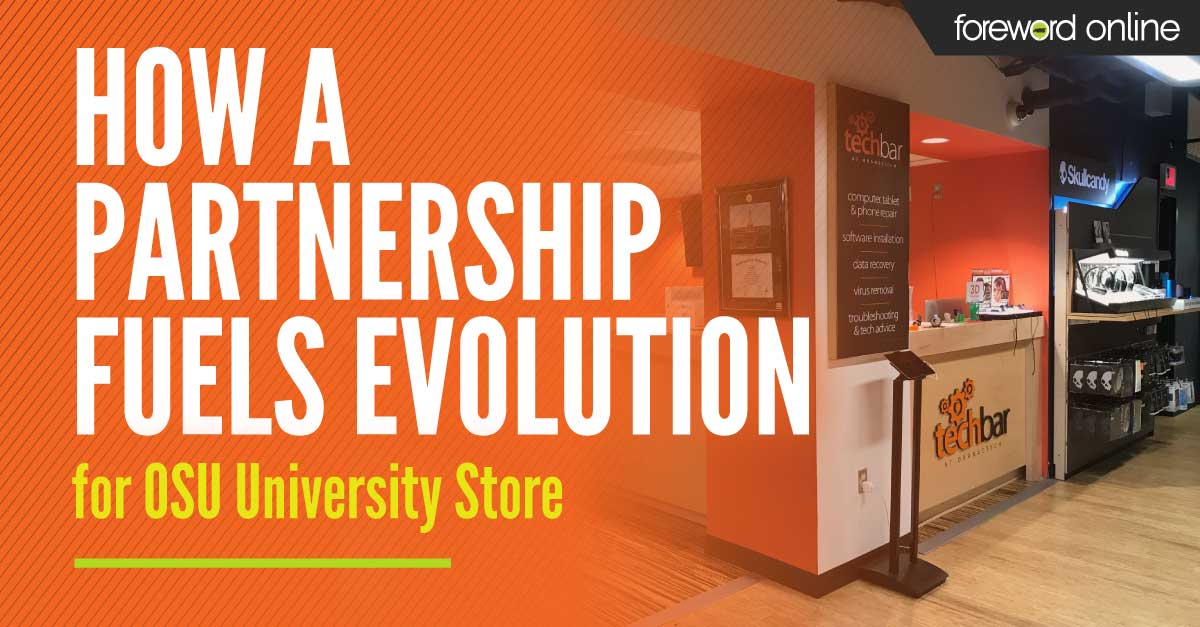College should be challenging, but, lately, many students find it downright overwhelming. Research shows a larger-than-ever percentage of students experience excessive pressure in school that harms their health, their learning and their chances for success. Anxiety is No. 1 among student-reported mental health issues, and collegiate retailers are stepping up to help solve the problem. Stores nationwide are hosting events dedicated to helping students combat stress, so they can stay in school and achieve their goals. Some empathetic and innovative retailers have turned to a resource not usually available on campuses: Furry, four-legged friends like dogs and cats.

Tracy Roman, associate finance director for UC Davis Stores, organized a De-stress Week on the quad during finals last spring that was so popular the store has committed to repeating the effort at the end of every term. Planned activities like rock-painting and giant Jenga attracted students to the five-day event, but the most popular day involved animals. The store brought in adoptable kittens and therapy dogs for students to play with, pet and snuggle between exams. Students who wouldn’t normally have paused in their routine took time out for the animals.
“The animal day was the most popular day,” said Roman. “All the students said, ‘I will stop for pets.’ It didn’t matter where they were headed. They were going to stop to hold a kitten or pet a dog. One of the dogs there had her own binder showing 200 tricks she could perform. The dog could ring a bell, stand up, roll over. Whether a freshman or a senior — everybody wanted to stop and talk to the dogs and cats.”
"That concern prompted us to reach out to our provost’s office. This is something I would recommend to almost any campus store. Find supporters in the administration. Work with an office that can lend additional authority to your request. This helped faculty see how the deadlines are part of a larger plan to support students and the university
Besides offering a refreshing break, it’s likely that the animal interactions actually helped UC Davis students earn better grades. An increasing number of studies show that dogs, cats and other animal friends are more than pleasant distractions: They’re good medicine. Time with a pet can be as or more effective than drugs for stimulating hormones that calm the human nervous system and prevent everyday stress from spiraling into anxiety. The Anxiety and Depression Association of America calls this the “pet effect.”
Shouldn’t they just get over it?
Those who don’t suffer from anxiety sometimes think it’s a petty concern that should be overcome with a little grit and a positive attitude. It’s true that term papers, final exams and late-night study sessions are good challenges, which help students develop a sense of autonomy, responsibility and accomplishment.
However, anxiety is different from the positive stress that increases adrenaline and motivates us to crack the books or meet looming deadlines. Anxiety brings dizziness, heart palpitations, nausea, disorientation, sleeplessness and scattered attention. When anxiety strikes, stress becomes paralyzing. Untreated, it can damage a host of bodily functions including cognition, memory, digestion, circulation and immune response.
Anxiety can damage learning and memory, and it can poison a person’s quality of life. Excess stress not only undermines productivity — it interferes with activities that many would otherwise turn to for relief. Watching TV, exercise, playing computer games, visiting with friends: these typically relaxing activities can become unbearable during a bout of clinical anxiety.
"Students always ask us, 'When are the dogs coming?'" said Justine Shelton of Davenport University in Grand Rapids, Michigan
In one study published in BMC Psychiatry, an anxiety sufferer described the mind-state and the positive impact feline friends can have.
“You just want to sink into a pit and retreat from the entire world,” she said. The cats force me to still be involved with the world,” she said.
Another patient theorized that pets offer something humans often can’t: Unconditioned, non-judgmental acceptance — no questions asked, no strings attached.
“[Pets] don’t look at the scars on your arms. They don’t question things and they don’t question where you’ve been,” he said.
Pets don’t need explanations about why you're upset, why you didn’t complete a homework assignment or whether you have studied enough. They don’t tell you to get over it. They simply offer the kind of relief a generation of kids increasingly needs.
A nervous cohort
Anxiety levels have spiked among young people — especially those born after 1995, known as Generation Z. Between 2009 and 2015, the number of students seeking help from counselors on campuses grew 30%, even though enrollment only increased 6%, according to the Center for Collegiate Mental Health. Among those going to counselors, 61% reported “overwhelming anxiety,” according to the American College Health Association.
"We've seen our fair share of stressed students," said Torian Keller of William & Mary Bookstore. "They come into our store, sit in our café, put their headphones on and just … work."
Some researchers blame the crisis on the rise of smartphones. Others argue that kids’ addiction to social media hampers interpersonal development. On Instagram, an awkward sentence or image can become a target for attack, not just from peers but from millions of strangers who share the post. Every time a teenager posts a meme or reflection, he or she risks crushing social opprobrium. With so much at stake, simple efforts to connect become meticulously crafted, self-conscious performances. When kids find themselves face to face with other human beings, they feel lost without technological support. You can’t auto-correct or photoshop a class discussion. You’ve got to be raw and imperfect. That can terrify those accustomed to polishing their images and thoughts before they’re shared.
The BMC Psychiatry research showed how pets can help. The study authors posited that pets provide anxiety sufferers with a sense of connectedness and “ontological security.” That is, they keep anxiety-sufferers grounded in the real, non-mental, non-virtual world. They take people’s attention away from catastrophic stories whirling in their minds and restore a sense of rootedness, perspective and self-efficacy. Pets accept human foibles without complaint.
In one study, 74% of owners reported that pets boosted their mental health, 75% said their pets improved a friend or family member’s mental health and over half (54%) said pets helped their physical health. Meanwhile, nearly all owners (98%) said they consider their pets significant members of their family.
College bookstores step in
The anxiety increase among students has prompted college retailers to think about ways to help students associate their store with a community that provides respite from fears the academic grind can induce.
Roman read an article about student stress in The College Store Magazine that inspired her to organize the UC Davis Stores event.
“I thought, We’ve got to do something to help these kids,” she said.

Roman realized the anxiety crisis among young people was out of control. She persuaded the UC Davis College Stores marketing department to organize a de-stress week devoid of the usual techniques retailers use to draw students, move merchandise and boost revenues. She was determined to keep the event free from any sort of promotion or gimmick. It was critical to convey the message that the store genuinely cares about student well-being.
“It’s a new message,” she said. “Usually store events are tied to a promotion or an event or rush or buyback. We were very careful to make sure that all we were saying was ‘We’re here to support you.’”
"Even for those who haven't ever had a pet, it's a calming influence," said Steve Levin of Swarthmore Campus & Community Store
Davenport University’s Student Life Team in Grand Rapids, Michigan has a similar offering. It hosts therapy dogs for a “stress-busters” week in the school’s Center for Campus Life at the end of each semester. Therapy dogs are trained specifically to help humans with psychological and physiological stress. They are highly sensitive to fluctuations in human emotion, nuzzling or even crying when a human friend exhibits signs of emotional distress. Just a brief encounter with such uncomplicated empathy can bring relief, stimulating the antidepressant hormone serotonin and oxytocin, what’s often called the “love hormone.” Oxytocin grounds us with a sense of connectedness and purpose.
“Students always ask us, ‘When are the dogs coming?’” said Assistant Director of Student Life Justine Shelton. “Even when they are busy, as soon as they see the dogs in the foyer they stop and instantly smile, come over and pet the dogs and then head off to the next exam.”
William & Mary Bookstore on Duke of Gloucester Street in Williamsburg, Virginia hosts a “De-stress Fest” at exam time every semester that features dogs from a local shelter. Assistant general manager Torian Keller said the store prioritizes student stress-relief in part because competition at the college is so intense.
“It’s very hard to get in to William & Mary, and once you’re in, the pressure is on. You’ve got to do the best you can. We’ve seen our fair share of stressed students. They come into our store, sit in our café, put their headphones on and just … work,” she said. “The De-stress Fest has been a great hit ever since we started. Who doesn’t love coming in and hanging out with dogs?”
A touch of home
Steve Levin of Swarthmore Campus & Community Store in Swarthmore, Pennsylvania discovered the therapeutic effect dogs have on students by happenstance. He had moved into a new house, and, during the weeks of remodeling, he brought in his two black labs, Bear and Allie.
“I thought maybe I could sneak them into the bookstore for a week,” said Levin.
One week turned into several and soon students became so attached to the dogs, Levin started bringing them with him to work daily. He said Swarthmore students bonded with the dogs and sought them out in moments of emotional need.
“It’s a little touch of home. Many missed their pets, but, even for those who haven’t ever had a pet, it’s a calming influence. Studies show that more companies are allowing employees to bring dogs to work, too. A lot of people are so jealous of me!” Levin said.
After Bear and Allie passed away, Levin got Molly and George, also black labs, and started bringing them into the store. At the time, he was the textbook manager, so the two canines showed up to work every day.

When the Swarthmore Campus & Community Store moved to a new location, the administration decided to honor students’ affection for Molly and George. Designers featured a silhouette of two black labs holding maroon shopping bags in their jaws in the store’s logo, and architects built a special cubby for Molly and George, outfitted with a doggie gate so the labs could watch customers come and go.
“They can see the public and the public can see them,” said Levin.
The new store location on the edge of town attracts families from the surrounding areas as well.
“Students, staff and little kids from the neighborhood always come in and say, ‘Are George and Molly here?’ Students come in and sit on the floor, lie down and hang out with the dogs,” said Levin. “The joke is that no one ever cares whether I’m here. They just want to see Molly and George!”
A prescription for student satisfaction
Should your school give four-legged friends a try? Associates at Swarthmore, Davenport, William & Mary and UC Davis strongly recommend bringing in animals to help students take a break and find a sense of home. Course materials can be costly, and collegiate retailers are often looking for ways to counter the misperception that their store exploits students. The animals help students bond with associates and realize the entire school aims to foster their success.
"Students come in and sit on the floor or lie down and hang out with the dogs," said Swarthmore's Levin.
“I would recommend animals to other organizations as a great way to help those in the environment relax,” said Davenport’s Shelton. “Many students enjoy this event — especially when they are missing a pet back home.”
Levin said it’s important for stores to have good-tempered animals involved. He said Molly and George have particularly mellow personalities, even for retrievers, which are known as a family-friendly breed.
“Molly and George are really chill,” Levin said. “You don’t want a dog that would go wild or start running around. Bear and Allie were pretty laid back, too.”
A little chill time with some laid-back friends is exactly the sort of medicine hyper-stressed young people need — and it can go a long way toward helping students foster a warm relationship college stores.





